The Wikimedia community; through the Wikimedia Foundation, its chapters Wikimedia Italia, Wikimedia Portugal, Wikimedia Germany, Wikimedia Switzerland and Wikimedia Spain; and the thematic organization Wikimedia Amical; was present at the 20th Triennial ICOM-CC Conference – València 2023, hosted by the Polytechnic University of Valencia from September 18 to 22, 2023.
A great global cultural event, aimed at the conservation and restoration of heritage, where around a thousand professionals attended to exchange knowledge and share experiences.
About ICOM
The International Council of Museums (ICOM) is a non-governmental organisation of museums and museum professionals, formed in 1946, which is committed to the protection and preservation of movable cultural assets and natural objects, and forms a portal to a global specialist network and think tank with headquarters in Paris.
With a membership of around 45,000 professionals in over 138 countries, it tailors their activities to professional advice on all museum issues, the anchoring of museum standards, as well as research and further training.
On the other hand, ICOM Triennial conferences are major events in the fields of cultural heritage and museums. They occur every three years and are hosted in Europe every six years. It gathers conservationists and other international museum professionals to share ideas, network, and learn about the latest technical and cultural developments.
The overarching vision is to make all the world’s movable cultural assets visible and accessible to museum visitors and everyone else, which is largely in line with Wikimedia’s values.
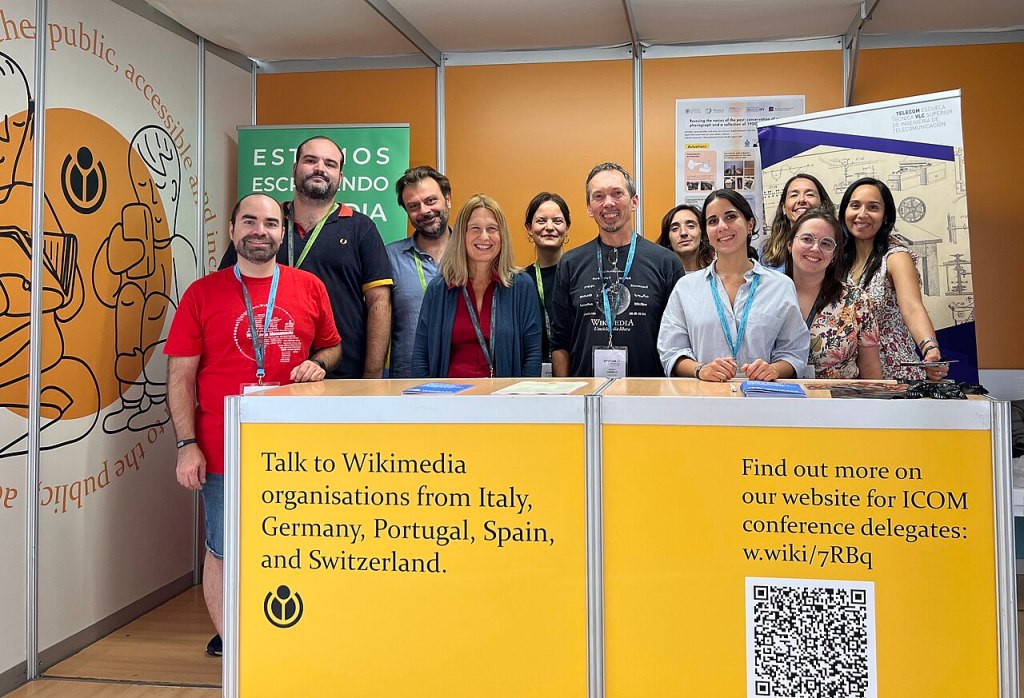
ICOM & Wikimedia
This year Wikimedia sponsored the ICOM Triennial. The reasons for this are new parallels that have arisen through the realignment of museums, which was decided on August 24, 2022 at the ICOM General Conference. Inclusion, participation and sustainability are now central aspects of the museum’s work, which could inspire more museums to collaborate with the Wikimedia movement.
“A museum is a not-for-profit, permanent institution in the service of society that researches, collects, conserves, interprets and exhibits tangible and intangible heritage. Open to the public, accessible and inclusive, museums foster diversity and sustainability. They operate and communicate ethically, professionally and with the participation of communities, offering varied experiences for education, enjoyment, reflection and knowledge sharing.”
Previously, Wikimedia affiliates have collaborated with ICOM, for example, by organising an International Museum Day campaign to document museums, illustrating and disseminating Red Lists to protect cultural heritage in Afghanistan and Southeast Europe, Discussing decolonisation and image description (video in Spanish), and empowering Italian GLAMs to use Wikimedia projects to share content related to their digital collections. For an overview and for eamples of collaborations between museums and Wikimedia projects, see also Fiona Romeo’s presentation here.
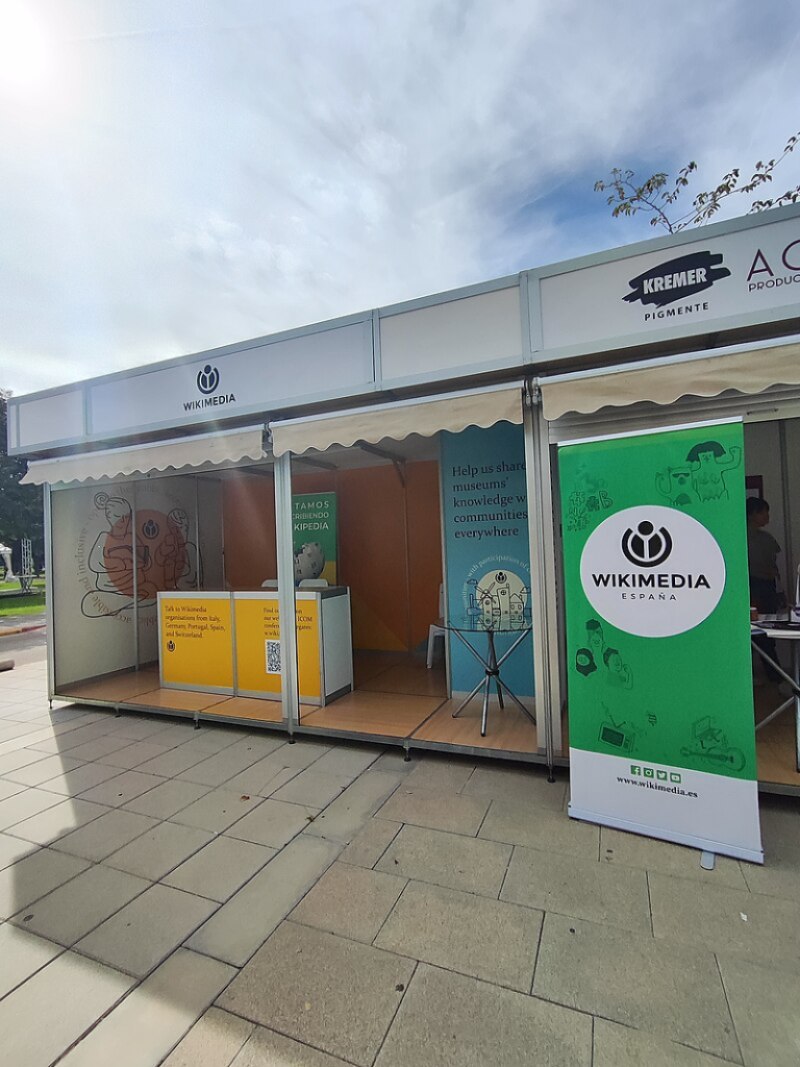
What we presented there:
Wikimedia Italy held two presentations. One of them was about how to approach Wikipedia if you are a museum, by Marco Chemello. He explained how museums are often interested in collaborating with Wikipedia content, as it is an invaluable asset, but do not know how to start. In this way, Marco analysed what are those most frequent problems and suggested how to prevent them.
The ‘Empowering Italian GLAMs’ project, by Alice Fontana, was also presented. A project led by Wikimedia Italia, ICOM Italia, Creative Commons Italia and the Department of Economics and Statistics of the University of Turin, aimed at making Italian institutions aware of open access and start contributing to Wikimedia projects.
From Wikimedia Spain, the role of Wikimedia projects in the construction of collective memory was presented by Rubén Ojeda. Collaboration with cultural institutions is key in this process, and Wikimedia projects have proven to be excellent allies when it comes to preserving and disseminating collective memory in the face of catastrophes, conflicts and policies that have endangered or destroyed heritage elements.
Wikimedia Germany presented Wikibase, Linked Open Data and Museums. Christos Varvantakis and Valerie Wollinger spoke about the opportunities offered by this free, open source software that stores and organises information that can be collaboratively edited and read by humans and computers, translated into multiple languages and shared with the rest of the world. Its flexibility allows curators, archivists, designers and researchers to create their own data models to meet their needs.
The Wikimedia Foundation, through Fiona Romeo, presented the ‘Wikisource Loves Manuscripts’ project, aimed at digitising and transcribing manuscripts. Once digitised, these manuscripts are used to establish underrepresented languages on the Internet, through Wikimedia projects; digitised manuscripts are also used to develop open OCR models for languages that are not supported by Google or other commercial services.
Wikimedia Portugal, through Rute Correia, presented on how a Wikimedian in residence can help a museum’s collections reach new and wider audiences. Wikimedians in residence are familiar with Wikimedia projects, and this facilitates the process of sharing collections, bringing knowledge and culture to the general public.
Sandra Becker from Wikimedia Switzerland focused her presentation on the common goals between the strategy of the Wikimedia movement and the definition of the ‘new museum’. Sandra explained about 3D work as saving heritage for possible future reconstruction, value changes in times of crisis and uncertainties.
In this way, the digitisation of cultural heritage is seen as providing access to everyone from everywhere.
Amical Wikimedia presented, through Núria Ribas, its digital volunteering programme, highlighting its transformative impact on the dissemination and enrichment of cultural and historical elements. This collaboration between museum collections and the Wikimedia community, known as GLAMwiki, stands as a powerful catalyst for the democratisation of knowledge, the preservation of cultural heritage and the promotion of a global learning ecosystem.
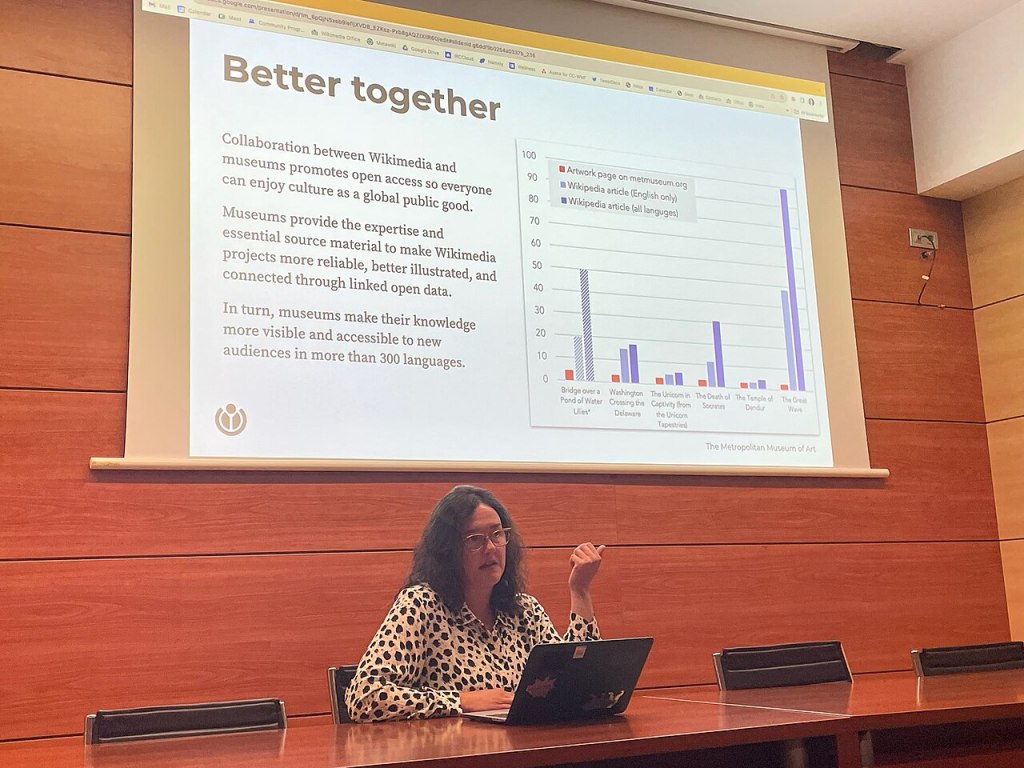
Highlights of the conference
At Wikimedia level
Contact and relationship with the GLAM world
Participation in the conference allowed us to establish contact with a significant number of museum professionals (around 1000 participated in the event). Likewise, attendance at the various scheduled sessions provided the opportunity to follow different debates on the future of cultural heritage, museums and conservation. All of this, in an incomparable setting, the city of Valencia as a whole, and the City of Arts and Sciences and the Polytechnic University of Valencia in particular.
Visibility of our work and Wikimedia projects
In addition to the sessions held during the impromptu meetings explained above, we must highlight the talk that, as sponsors, we had the opportunity to offer. It was given by Fiona Romeo and focused on the possibilities of collaboration that Wikimedia projects offer to cultural institutions.
Partnership opportunities
The stand we had at the fair held on the 19th, 20th and 21st gave us the opportunity to answer any queries related to our work, offer promotional material, or facilitate contact with other chapters. Thus, weeks later we were informed of cases in which a chapter had been contacted by people who had met us at the conference in Valencia. At the stand we also had various items from local museums with which we collaborate, such as the Copa de la España Libre, a historic trophy won by Levante Fútbol Club in 1937.
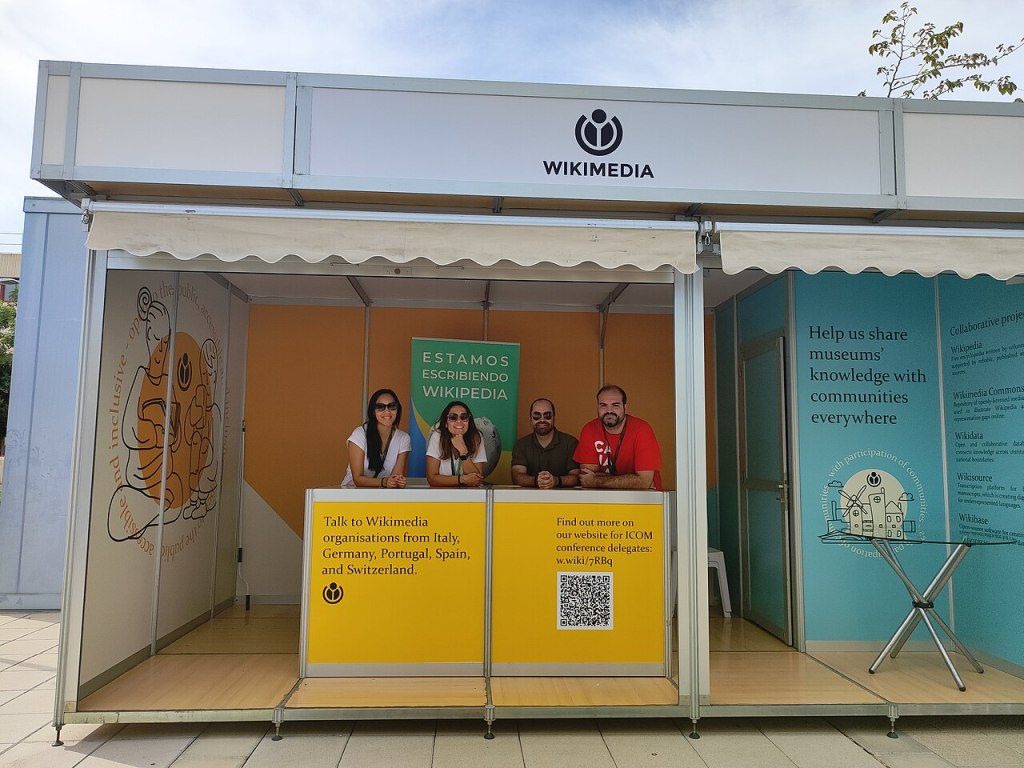
At Community level
Meeting between Chapters
This meeting also allowed us to learn about the current situation of each participating Wikimedia Chapter. We exchanged experiences, anecdotes, knowledge and realities that each one of us is currently studying within the community. Creating synergies for future projects and knowing the agenda of events and proposals of each one.
Fraternising with the Community
Our presence at the conference not only included the official programme of sessions and stand, but also a social agenda that included different leisure activities that allowed us to spend time together, get to know each other and strengthen community ties. Thanks to our hosts, Wikimedia Spain, we had a guided tour of the historic centre of the city of Valencia, chosen as the European Green Capital 2024, a recognition promoted by the European Commission, which rewards the leading cities in ecological and clean environmental policies.
We also took the traditional boat trip through the Albufera de Valencia natural park, where each of the participants had the opportunity to enjoy the natural landscape of the area, and afterwards, to enjoy the local gastronomy.
One of the most important activities on the agenda was the guided visit to the museum of Valencian popular culture: Museo Etno, named European Museum of 2023 (EMYA 2023). Led by its director Joan Seguí, we had the opportunity to get to know every corner of the museum, which seeks to collect, investigate and share all the manifestations that are born from the Valencian popular culture.
After the conference and our participation, we have managed to maintain contact in the participating Chapters, with the aim of continuing to work with ICOM, as well as future projects in the GLAM world that allow us to continue working for the dissemination of culture and knowledge. Our first meeting, after ICOM, was on October 25th, with the aim of maintaining regular meetings.
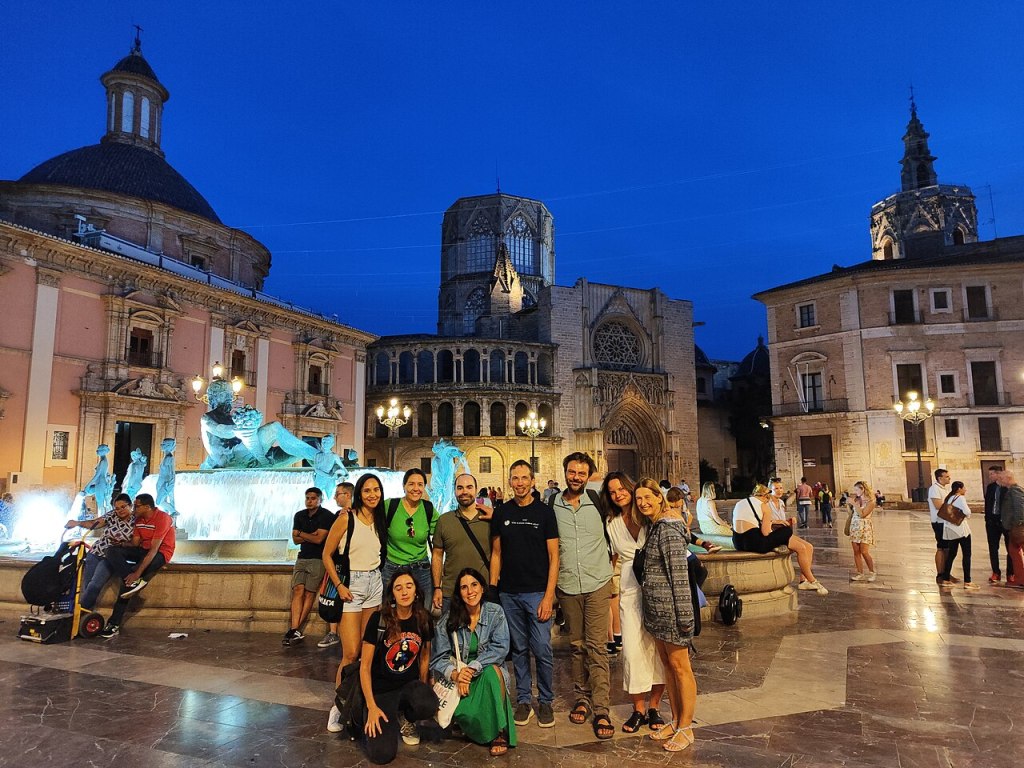
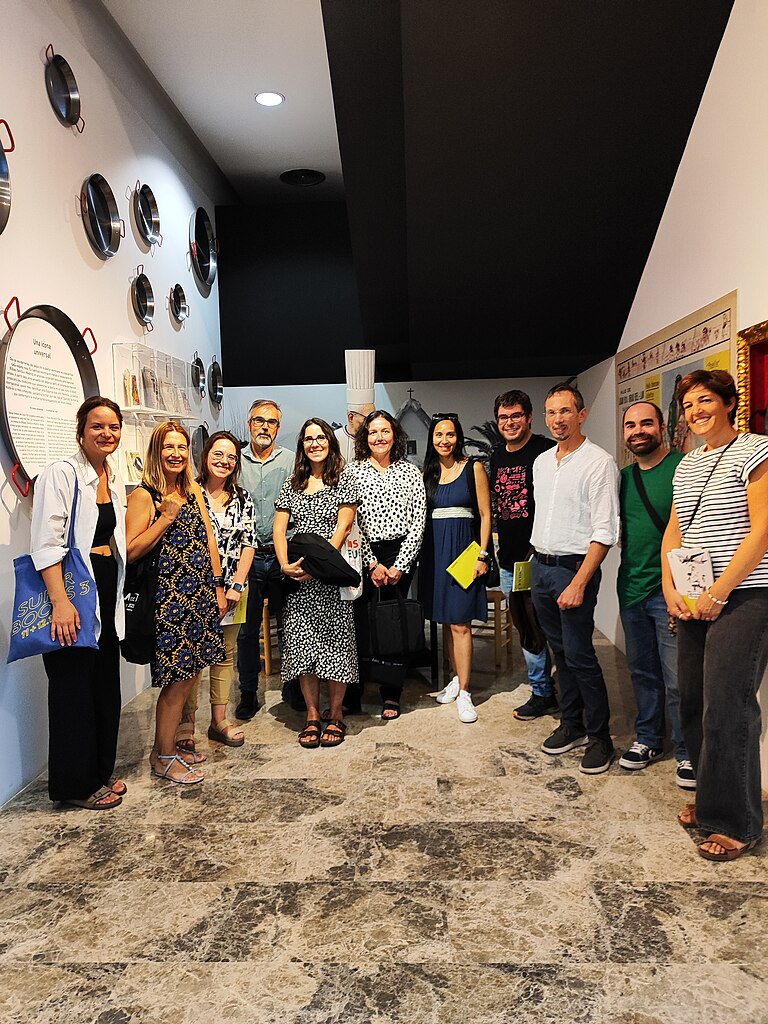
Reflections and Wikimedia’s future with ICOM?
In general the concept with the purpose for taking part was successful:
ICOM is interested in future collaboration, the Wikimedia chapters had a lot to offer that was presented at the fair running the stand as well as giving talks presenting our museums related work.
The strategy of Museums and our movement interact in their purpose and museums are interested to open up collections and to work with us.
For Museums the 17 sustainability development goals (SDGs as also presented at the United Nations) are key for future work.
It is a huge global change due to all the crisis situations in the world.
Our projects are valued and in line with the ICOM strategy: the international museum day, the work on red lists of missing objects, open access to collections, decolonizing heritage, addressing the youth by opening up and provide access with future hybrid events, including the global south, better working conditions for qualified academics, work on closing the knowledge gaps etc.
The chapters should work more on an international and global level to create a bigger impact. Therefore several concrete projects have been decided to work on:
- International museum day: international campaign involving as many chapters as possible (WMCH will setup project page on Meta for other chapters to join with links to their projects)
- ICOM membership for wikimedians in order to get access to museums and to link their work with the wiki platforms
- Focus on the SDG’s in the wiki projects relating them to museum’s topics
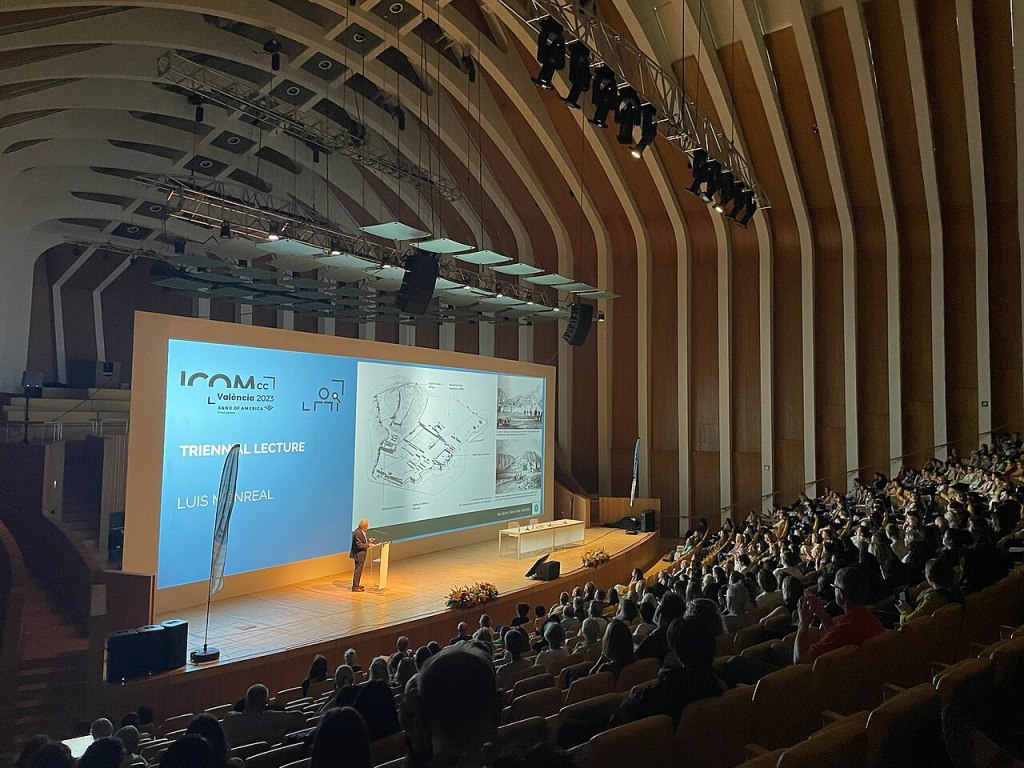

Can you help us translate this article?
In order for this article to reach as many people as possible we would like your help. Can you translate this article to get the message out?
Start translation